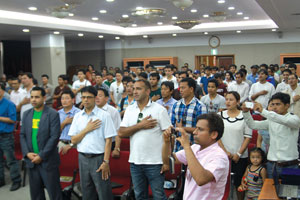 |
Some took leave from work, some cancelled their prior engagements, some travelled several hours, and all of them braved the humid heat of the South Korean summer this month to give away a portion of their earnings to fellow Nepalis back home.
The 200 or so Nepalis who had packed the community hall in the centre of Seoul were well aware that the function they were attending just offered a documentary film of the work being done by the HELP NEPAL Network (HeNN), a unique charity that mobilises overseas Nepalis to donate small sums to improve education and health in remote parts of Nepal. There wasn't going to be any music, dance or comedy from visiting Nepali artists, there would be no food or drinks. But still they came, they stayed, and they queued up to donate generously.
Those attending were expected to dig into their own pockets and give away whatever they could to the Network's ambitious plan to set up a Rs 100m endowment fund. By the end of the two-hour programme, Rs 600,000 was raised. Nearly 200 other Nepalis who could not be there deposited over Rs 400,000 in a special bank account.
In my 12-year association with various charities, I have not come across such an overwhelming response. More than Rs 1 million was raised in two hours, this had never happened before. Moreover, it came from Nepalis who were not that well-off. Over the years I have seen that Nepalis who have less tend to be more generous than those who are relatively well-off.
HeNN promotes practical philanthropy by encouraging Nepali individuals and institutions to assist health and education projects in Nepal without relying on foreign donors. It asks Nepalis around the world to sacrifice a bottle of beer or a few cups of tea a month, and donate the small amounts to the Network.
Back home in Nepal, the Network has so far built more than 80 schools, libraries, run numerous health camps and supported victims of natural and fire disasters. It will also start an orphanage for 40 girl children in Dhulikhel soon. It is running a health post in Murma of remote Mugu district and another health post in Siraha.
The Network does not spend any of the funds donated on administration, and has a separate endowment fund to cover overheads which was set up with grants worth Rs 7 million from 25 overseas Nepalis and Rs 10 million from entrepreneur Siddhartha Rana. HeNN meets its office expenses from the interest from that fund.
As a new sustainable fund-raising initiative, the Network decided last month to launch an ambitious fund-raising plan to set up a Rs 100 million HELP NEPAL Charitable Endowment Fund with the help of Nepalis both in and outside of Nepal. It hopes to raise Rs 1,000 each from 100,000 Nepalis to reach the goal.
In fact, the Network has already raised Rs 3 million in less than six weeks which includes the contribution in Seoul. Many Nepalis donated Rs 100,000 each, including Korea-based restaurateur and social worker, Rudra Sharma, a key sponsor of the Seoul fund raising event.
"The spontaneous donations from so many Nepalis in such a short time were a clear indication of the trust Nepalis have on the HELP NEPAL Network," Sharma said.
Raghu Tripathi, the Editor of HelloNepalKorea.com, one of the organisers of the event, said he was pleasantly surprised at the willingness shown by Nepalis to help Nepalis back home. "If Nepalis elsewhere in the world are as generous, it will make a huge difference in improving the lives of Nepalis back home," Tripathi said.
The HELP NEPAL Network initiative is endorsed by Nepali Times.
Rabindra Mishra works with the BBC World Service and is the founder president of HELP NEPAL Network.
www.helpnepal.net
To donate online:
www.helpnepal.net/story/appeal-rs-100m-charitable-endowment-fund
See also:
Nepalis helping Nepalis, RUBEENA MAHATO
Unique charity launches the 'Rs 100 Per Month Fund for Nepal'
Philanthropic journalism, RABINDRA MISHRA
Nepali Times partners with the HELP NEPAL Network to support Nepalis in need



